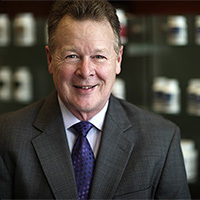By Jim Paoletti, B.S. Pharmacy, FAARFM, FIACP | Director of Education, Power2Practice
Diet is the first consideration in a natural approach to treating allergic and sensitivity immune reactions. Patients need to pay attention to what they eat and how they feel afterwards (up to 3 days). A food and symptom diary can provide insight as to what foods if any are causing issues.
Patients can take the approach to eliminate all probably sensitizing foods by following a detox diet for 2-4 weeks:
- Meals and snacks consist of whole foods, lean protein with each meal and snacks, vegetables, fruits, salads and good oils.
- Avoid processed foods, alcohol, caffeine, margarine, processed oils, all grains, all soft drinks, all high glycemic index foods and sweeteners including refined sugar, brown sugar, high-fructose corn syrup, honey, syrups, malt, and artificial sweeteners other than Stevia.
- A more extensive and detoxifying elimination diet would also include avoiding all dairy, eggs, beef (other than lean organic), citrus fruits, vinegars, and mustards.
- If this elimination approach is taken, foods should be reintroduced individually and slowly.
Elimination of allergy-provoking factors is another important aspect for many patients.
Detoxify the living environment as much as possible:
- Avoid air fresheners, perfumes, scented candles, etc.
- Use only natural cleansers, soaps and cosmetics.
- Vacuum with a unit equipped with a HEPA filter, and if allergies are not responding, consider removing all carpet and padding.
Address stress and the stress response in patients as this can add to the burden on the immune system.
Vitamins and minerals can affect so many reactions involved in the inflammatory cascade.
- A good, pharmaceutical grade multivitamin and mineral manufactured by a nutritional company is recommended daily for everyone.
- Essential fatty acid balance is important to the control of inflammation, so a purified mercury-free and PCB-free supplement is highly recommended.
- Flax seed oil and freshly ground flax seeds are other good sources for EFAs.
- A good probiotic is a must for all patients. I prefer patients stay on probiotics daily, and rotate the probiotic brand every 3-4 months.
- Digestive enzymes can help alleviate intestinal inflammation and should be included for at least the first 2 months.
For patients who find it difficult to comply with the above strategies for personal reasons, there are two methods that have been used to desensitize patients:
- Nambudripad’s Allergy Elimination Techniques – www.naet.com
- Neuromodulation Technique – www.nmt.md
We at Power2Practice wish you and your patients an enjoyable Spring season transition!
In Good Health,
Jim Paoletti, FAARM, FIACP
Jim Paoletti, BS Pharmacy, FAARM, FIACP, is the Director of Education at Power2Practice and a nationally-recognized expert in pharmacy, BHRT and custom compounding, and has previously served as Director of Provider Education for ZRT Laboratory and Education Director for the Professional Compounding Centers of America. At Power2Practice, Jim applies his wealth of knowledge and experience by hosting live webinars and creating clinical support tools, such as podcasts and blogs.


